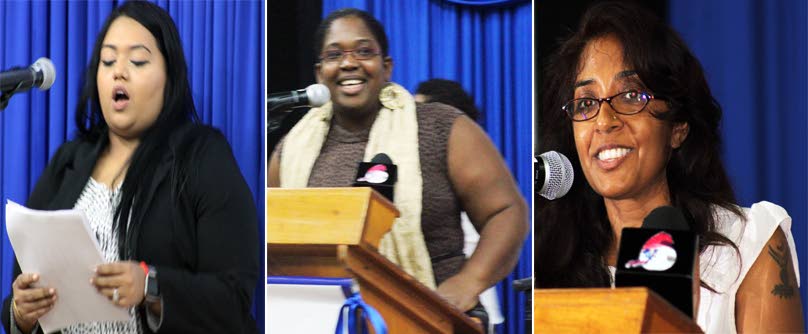Teach infants about sex abuse

IT IS time this nation wakes up to the grim reality that children as young as infants of nursery- school age must be taught about sex abuse so that they can guard themselves against this crime. But teach them using age-appropriate language.
This was the plea yesterday from Dr Gabrielle Hosein, head of the Institute for Gender Development Studies (IGDS), UWI, St Augustine at a forum titled, Breaking the Silence, at the School of Education, UWI, St Augustine campus.
Lamenting that children as young as three experience sexual abuse, Dr Hosein said early childhood care and education (ECCE) centres or privately-run nurseries are well-positioned to make all the difference to preventing abuse by teaching infants to protect themselves. Hosein said UWI alone cannot remedy such abuse, but needs help from teachers, who can use the teacher training toolkit available from the IGDS website.
“The toolkits have been piloted with schools. We hope to empower you to use the arts to let students express issues they are experiencing and articulate their vision for a safer, more peaceful and empowered world.”
She lamented that child sexual abuse and incest devastate their victims and debilitate the society for generations to come. But, she told the packed auditorium, “We can make a difference. The people in this room alone can change the world.”
REDDOCK: HELP
PARENTS COPE
For her part, Prof Rhoda Reddock, former deputy principal of the St Augustine campus said parents must be helped to cope with their familial duties. While much of the conference heard that child sexual abuse is often perpetrated by men and women closely related to the victims, Reddock focused on adults aspiring to be good parents.
She said abuse is best tackled by having gender and sexuality education taught within health and family life education (HFLE) in schools and by good parenting. “Parents need support and help. Parents are struggling. We need to support parents and not just blame them. Give them the tools.” Reddock noted that most people simply cannot afford the cost of psycho sociological support.
Reddock gave the findings of her research in the, Break the Silence Project of 2008-2011, in which she was lead researcher. She said while child sexual abuse has been criminalised and is more rampant in some communities than others, it had not been fully investigated until that project and one in the eastern Caribbean were done.
Noting that ten per cent of complaints to the Rape Crisis Society involve incest, she gave figures to show the prevalence of such abuse. In six months of 2006 were 165 cases of child sexual abuse (85 per cent of which victims were girls), she said. Reddock said in one year, 2013, the police reported 200 cases of incest, rape and sex abuse in Central Trinidad alone.
TRUST YOUR
INSTINCTS
This was the advice, given at the forum, by clinical psychologist Dr Nirvana Maharaj who said if “TRUST your instincts” if your gut feeling is that a child is being sexually abused, teachers and activists were advised yesterday by clinical psychologist Dr Nirvana Maharaj. “Do something, take action!” she urged.
Maharaj said in her job of treating victims and perpetrators of abuse, she often hears terrifying stories, reflected in victims’ drawings of their sad encounters. Agreeing with Dr Hosein, Maharaj said teachers are ideally placed to make a huge impact in the lives of such victims. She said most child sexual abuse occurs at age seven to 13 years. While parents often warn their children of “stranger danger,” 90 per cent of child sex abuse is perpetrated by people known to the child.
She said marital violence has a big correlation with incest and listed the main symptoms of incest abuse as feelings of betrayal, powerlessness and shame. Incest is usually more harmful than abuse by a stranger. She lamented that offenders try to victim-blame by claiming the child “enticed” them such as by sitting on their lap. However, Maharaj added that recovery is faster if parents believe and support their abused children.


Comments
"Teach infants about sex abuse"